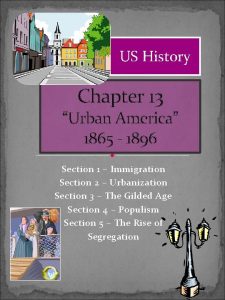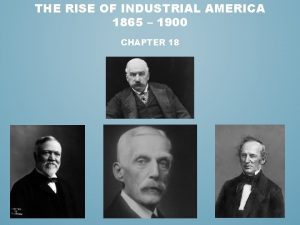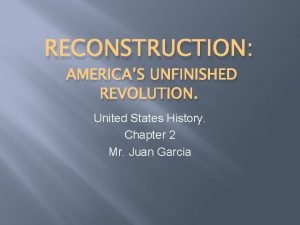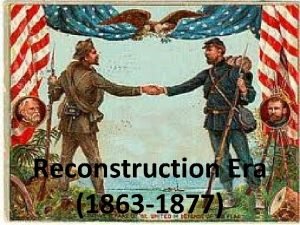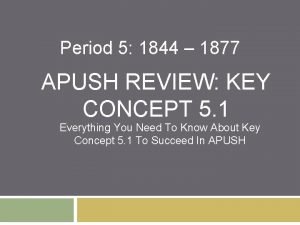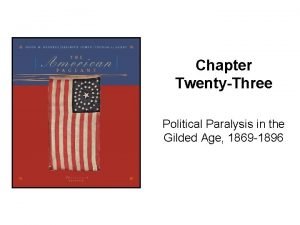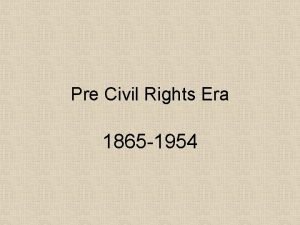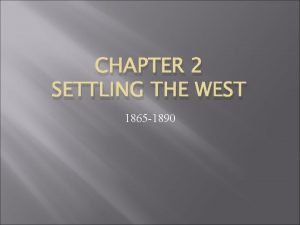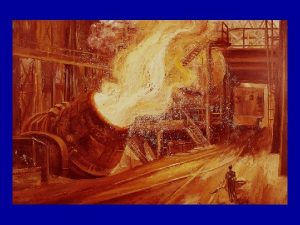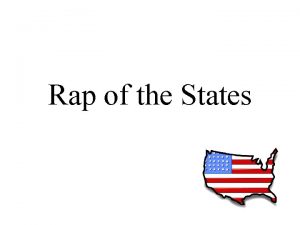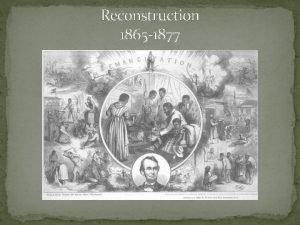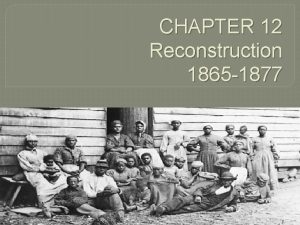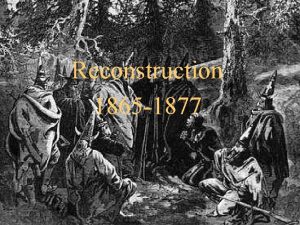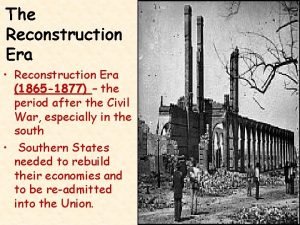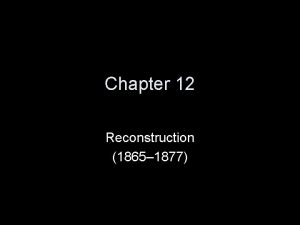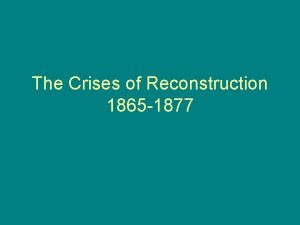Reconstruction 1865 1877 In what ways will America



































- Slides: 35

Reconstruction: 1865 -1877 In what ways will America need reconstruction after the Civil War?

South was occupied by the Union Army from 1865 -1877 1. Which military district was Texas a part of? 2. Which state was readmitted back into the U. S. first? 3. Which states were the last to be accepted back into the U. S?

“Binding up the Nation’s wounds” After the 13 th, 14 th, and 15 th amendments, 17 African American were elected to Congress in Southern states. The first was Hiram Rhodes. They passed progressive reforms in education, veteran benefits, and worker rights. Southern Republicans (including African American politicians) were called “Radical Republicans”

Which federal plan for readmitting rebel states to the US do you feel was most fair? Lincoln’s 10% Plan 10% voters must take oath of loyalty New state constitutions must ban slavery Rebels cannot hold office Amnesty (forgiveness) to all BUT leaders of Confederacy Educated Blacks can vote or those who fought for the Union Radical Republicans of Congress 50% voters must swear loyalty New state constitutions must ban slavery Rebels cannot hold office Only southerners that didn’t fight could elect reps. Want citizenship for all freedmen (ex-slaves)

Andrew Johnson's Plan of "Restoration" Lincoln refused to sign Congress’ plan & was soon assassinated. He was replaced by Andrew Johnson. 1. He pardoned all rebels who swore loyalty 2. Officers & wealthy landowners had to PERSONALLY apply to the president to vote. 3. Southern states ratified the 13 th amendment (ended slavery) 4. Acknowledged the FEDERAL government was SUPREME over state govt’s 5. Governors were appointed by Johnson/ONLY WHITE MEN COULD VOTE

Radical Republicans oppose Andrew Johnson Radical Republicans wanted: 1. Revenge—a desire to punish the South for causing the war. 2. Concern for the freedmen—believed the fed. govt. had to help ex-slaves. 3. Helping the North—keep the Republican Party in power, raise tariffs, help banks and businesses, encourage western settlers, and provide federal aid for railroad development. Johnson’s veto was overruled 120 times!

• Radical Republicans hated Johnson for not supporting their pro-North laws. • They impeached but did not convict Johnson over appointing a government official without Senate approval. • Johnson lost re-election to General Grant.

Freedman’s Bureau Created in 1865 to “supervise and manage all abandoned lands, and the control of all subjects relating to refugees and freedmen. " 1. Issued rations (food) & clothing 2. Abandoned “Confederate” property was held for eventual lease and sale to exslaves. *Rumor: Freedmen were promised forty-acres and a mule. 3. Helped families reunite 4. Set up schools 5. Provided medical care



Those who took advantage: Carpetbaggers: Northerners who moved to the Southern United States after the Civil War to seek political or commercial advantage. Scalawags: Native white Southerners who helped with the occupying forces (Republicans) during Reconstruction, often for personal gain.

The Republicans leave the South In 1877 Republican Rutherford B. Hayes ran against Democrat Samuel Tilden in a disputed election. Tilden got only one electoral vote short of the majority needed--and nearly 300, 000 more popular votes than Hayes. However, there were 20 disputed electoral votes. Compromise of 1877: Republican Hayes was elected in exchange for the withdraw of federal troops from the south and creation of a southern transcontinental railroad line. Republican govt’s in the south collapsed, ending Reconstruction. The plight of southern Blacks was forgotten in the north as they were segregated and condemned to live in poverty with little hope.


Life in the South

What are the symbolisms of this cartoon?

The Black Codes of 1865 The Black Codes regulated civil and legal rights, such as marriage, freedom of speech, freedom of movement, occupational choice, and the right to hold and sell property. Disenfranchised through poll taxes and literacy tests. Freedmen usually had to work for their exslave masters for pennies a day as a farmer with little protections. Slavery was replaced by sharecropping. Segregation was strictly enforced in all public places such as restaurants.

Sharecropping Ex-slaves often had difficulty finding work, which forced them to turn to sharecropping – a system where landowners gave workers land, seed, and tools in exchange for part of the crops they raised. Under sharecropping, 80% of ex-slaves continued to work for their ex-masters. With high rents, most freedmen were in continuous debt to Southern land owners.


What accounts for the drop and rise of cotton production in the South?

Crow” It shall be unlawful for a negro and a white child to play together or in company with each other at any game of pool or billiards. All marriages between a white person and a negro, or between a white person and a person of negro decent to the fourth generation inclusive, are hereby forever prohibited. No person or corporation shall require any white female nurse to nurse in wards or rooms in hospitals, either public or private, in which negro men are placed. The schools for white children and the schools for negro children shall be conducted separately. The officer in charge shall not bury, or allow to be buried, any colored persons upon ground set apart or used for the burial of white persons.

A 100 years of Discrimination and Prejudice The KKK: Organized American Terrorism


In what ways were the 13 th, 14 th, and 15 th Amendments disregarded in the South?

“Jim Crow” laws were slowly abolished beginning in the 1940’s and ending in the 1960 s with the Civil Rights movement.

What about the West?

New laws and opportunity out West Homestead Act: offered farmers 160 acres of public land in the West for free. All the farmer, or homesteader, had to do was clear the land farm on it for 5 years. At the end of 5 years, the homesteader was then given ownership of the land. The law’s promise of free land was a success. From 1860 to 1910, the number of farms in the U. S. tripled from 2 million to over 6 million.

Morrill Act: also known as the Land Grant College Act, it was a major boost to higher education in America. The grant was originally set up to establish institutions in each state that would educate people in agriculture, home economics, mechanical arts, and other professions that were practical at the time.


Dawes Act 1887: Law that attempted to assimilate or “civilize” Native Americans by treating them as individuals, not as a tribe. Natives were forced to own and farm individual plots of land, not communally. Natives were forced to wear western style clothes, go to school, and speak English only in public. To what extent is modern America tolerant and respectful of different cultures?

Transcontinental Railroad Pacific Railroad Act called for a transcontinental railroad to link the Atlantic and Pacific coasts. Workers for this project included Chinese and Irish immigrants, Mexicans, ex-soldiers, and freed slaves. Launched a new wave of social, cultural, and industrial migration west

What was the legacy of the Reconstruction Era?



Reese v. US A Kentucky electoral official refused to allow an African American to vote and was indicted because the 15 th Amendment says that elections should be conducted “without regard to race, color, or previous condition of servitude. ” The Court agreed that it was wrong to stop the African American from voting, but said that it was the State’s right to punish the electoral official, not the Federal governments. So, nothing was done to stop it.

Cruishank v. US Armed white mob in Louisiana attacked and killed over 100 blacks during a hotly contested gubernatorial election. White ringleaders were brought to trial and found guilty. However, the Supreme Court said that the “Due Process” and “Equal Protection” clauses of the 14 th Amendment protects citizens only from state action, not from the actions of other citizens. Because the indictments did not allege that the defendant's actions were based upon race, interference with the victims' right to vote was also not federally protected. The government did not protect African Americans from hostile white southerners.
 Whats the compromise of 1877
Whats the compromise of 1877 Urban america 1865 to 1896
Urban america 1865 to 1896 The rise of industrial america 1865-1900
The rise of industrial america 1865-1900 Four features of industrial manufacturing (1865-1900)
Four features of industrial manufacturing (1865-1900) Chapter 2 reconstruction america's unfinished revolution
Chapter 2 reconstruction america's unfinished revolution Gods ways are not our ways
Gods ways are not our ways Reconstruction era art
Reconstruction era art Compromise of 1877 apush
Compromise of 1877 apush Whats the compromise of 1877
Whats the compromise of 1877 1894 railroad strike
1894 railroad strike Compromise of 1877 apush
Compromise of 1877 apush 1877 golden 1
1877 golden 1 The key tradeoff featured in the compromise of 1877
The key tradeoff featured in the compromise of 1877 Compromise of 1877
Compromise of 1877 Tanssija 1877-1927
Tanssija 1877-1927 1877 to 1918 cloze notes
1877 to 1918 cloze notes Gilded age labor strikes
Gilded age labor strikes The gilded age 1877 to 1898 worksheet answers
The gilded age 1877 to 1898 worksheet answers Where did the term impressionism come from
Where did the term impressionism come from 1954-1865
1954-1865 Becoming a world power 1865-1917
Becoming a world power 1865-1917 Regionalism in american literature
Regionalism in american literature Industrialization 1865 to 1901
Industrialization 1865 to 1901 Soddie
Soddie Industrialization (1865 to 1901 worksheet answers key)
Industrialization (1865 to 1901 worksheet answers key) Becoming a world power 1865-1917
Becoming a world power 1865-1917 Gregor mendel 1865
Gregor mendel 1865 Hollywood silver fox farm v emmett
Hollywood silver fox farm v emmett 1865 to 1900 inventions
1865 to 1900 inventions What are characteristics of impressionism
What are characteristics of impressionism Why is latin america called latin america
Why is latin america called latin america America america you mean the world to me
America america you mean the world to me Happening e performance
Happening e performance America vs africa
America vs africa Whats an onomatopeia
Whats an onomatopeia Mesquite ancestral state reconstruction
Mesquite ancestral state reconstruction

